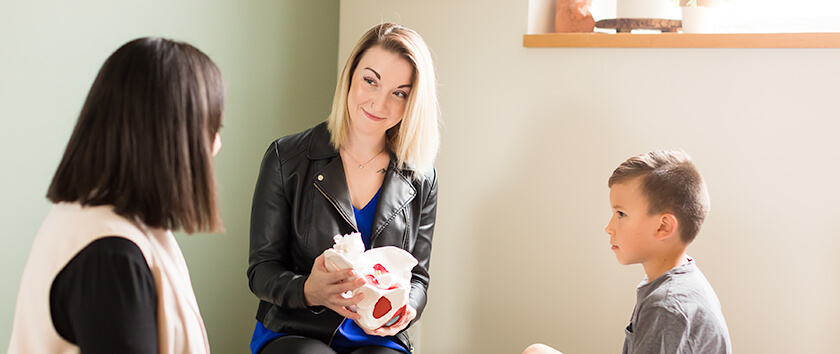
Pediatric Physiotherapy
At Pine Cone Health, we believe that children get the most out of their rehab when they are engaged, challenged and most importantly having fun!! Our Pediatric Physiotherapy strives to improve and enhance your child’s development and physical functioning through creative and engaging exercises, which may look like a lot of fun and play. Our therapists use their neurological, orthopaedic and developmental skills to help reach their functional goals. We believe in “family centered care” and that rehab continues in the home as well. We will work with parents and caregivers so they can continue doing rehab in their home to further help their child grow and reach their full potential.
Pediatric Physiotherapy Services We Provide
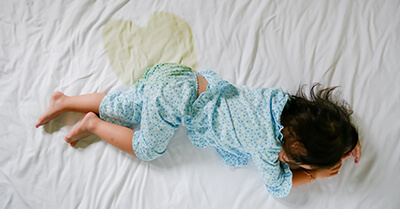
One of the great parenting challenges. This can be such a difficult issue for both children and parents and it’s more common than people might think. Our pediatric pelvic floor Physiotherapist will help to identify what is contributing to night time (or daytime) wetting. We will look at behavioural impacts such as bladder habits, hydration, digestion, and physical activity. Then we will also address any specific control issues that fall under the role of the pelvic floor muscles. There is no internal exam of children but learning how to strengthen, and relax, the pelvic floor muscles is an important part of curing bed wetting
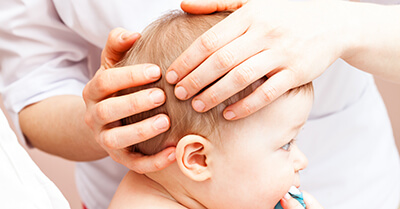
For infants who have torticollis/ and head shape (neck tightness and skull deformities) concerns, we will perform a comprehensive assessment and come up with a customized treatment program for your child.
This may include stretching and strengthening of weak and tight muscles, repositioning advice to help with skull deformity and ongoing follow up. With early intervention these conditions can be treated easily and effectively.
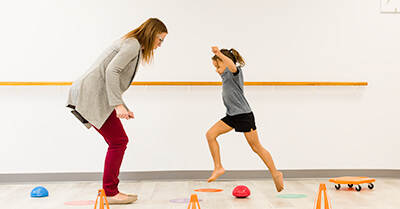
Are you a new mom and worried that your child isn’t rolling, sitting, crawling, walking or jumping yet? Do you have questions about your infant or child’s development? We are here to help. Through formal and informal assessments, and looking at how your child moves we can provide you with recommendations on things that you can do at home to prevent further delays and how to improve their skills in a fun and exciting manner. We also work with children who have a confirmed disability or condition to improve their development and participation.
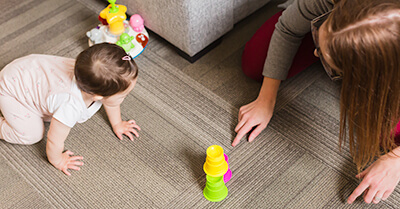
Precision movements of the hands, fingers, feet, toes are called fine motor skills. These are the skills that allow us to pick up small objects, use cutlery, write, play the piano, and do almost all of the tasks that we need to get done in a day! Fine motor skills develop from a strong core and stable base.
Our Physiotherapists will help to identify why your child might be having difficulty with precision tasks and make a plan to work on them. Treatment will consist of play based therapy in clinic, and recommendations for how you can support this skill development in your child at home.
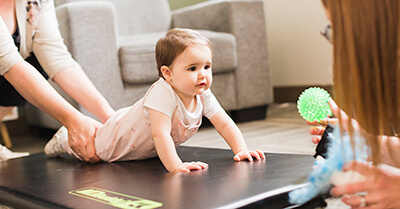
It is easier said than done!! We know how important tummy time is for a child’s development and preventing head shape concerns, but some babies just don’t like it. That’s where pediatric physiotherapy comes in. As physiotherapists, we can show you different ways of doing tummy time and find ways that work best for your baby. That way you can feel confident you are on the right track and go home with a toolbox of ideas to keep practicing.
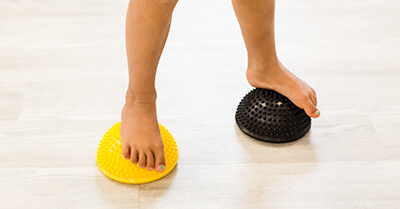
Toe walking is a pattern of walking on the balls of your feet without your heels touching the ground. In the absence of another medical condition we call this “idiopathic toe walking”. Walking on your toes can lead to a variety of issues. There are a variety of strategies we can provide to help curb this pattern before it gets even harder to correct. Early detection and correction is key.
Pediatric Physiotherapists
![]()
We are here to help you grow your health!
Some of the Struggles We Can Help Your Child or Teen With:
Bedwetting
Pelvic pain
Constipation
Gross Motor Delays
Fine Motor Delays
Global Developmental Delays
Juvenile Rheumatoid Arthritis
Positional Plagiocephaly
Brachycephaly
Toe Walking
Torticollis
In-toeing
Cerebral Palsy
Brain Injury
Down Syndrome
Autism Spectrum Disorder
Delays Resulting from Premature Birth
Other Neurological Conditions
Sports & Orthopaedic Injuries
How Do I Know if My Child Needs Physiotherapy Treatment?
How Do I Know if My Child Needs Physiotherapy?
A children’s physiotherapist can help your child reach the motor milestones detailed below, and ensure that they are moving in a way that best supports their physical development. The following chart provides information on milestones and warning signs to look for, broken down by your child’s age.
Motors Skill Milestones for Children from Birth to Age 6:
* Credit to pathways.org for the chart information
| Milestones | Warning Signs |
|---|---|
| While lying on tummy, pushes up on arms | Difficulty lifting head |
| While lying on tummy, lifts and holds head up | Stiff legs with little or no movement |
| Able to move fists from closed to open | Keeps hands fisted and lacks arm movement |
| Able to bring hands to mouth | Pushes back with head while lying on back |
| Moves legs and arms off of surface when excited |
| Milestones | Warning Signs |
|---|---|
| Uses hands to support self while sitting | Sits with a rounded backs |
| Rolls from back to tummy and tummy to back | Poor head control and unable to lift head |
| While standing with support, accepts entire weight with legs | Difficulty bringing arms forward to reach out |
| Reaches for nearby toys while on tummy | Arches back and stiffens legs when pulling to a sit |
| While lying on back, reaches both hands to play with feet | Holds arms back and has stiff legs in a supported stand |
| While lying on back, transfers a toy from one hand to the other |
| Milestones | Warning Signs |
|---|---|
| Sits without support | Uses one hand predominately |
| Sits and reaches for toys without falling | Rounded back when sitting, inability to straighten back |
| Moves from tummy or back into sitting | Poor use of arms in sitting |
| Starts to move with alternate leg and arm movement e.g. creeping, crawling | Difficulty crawling |
| Picks up head and pushes through elbows during Tummy Time | Uses only one side of the body to move |
| Turns head to visually track objects while sitting | Cannot take weight on legs |
| Shows more control while rolling and sitting | Does not transfer toys from one hand to the other |
| Picks up small objects with thumbs and fingers | |
| In simple play imitates others |
| Milestones | Warning Signs |
|---|---|
| Pulls to stand and cruises along furniture | Difficulty getting to stand because of stiff legs and pointed toes |
| Stands alone and takes several independent steps | Only uses arms to pull up to standing |
| Moves in and out of various positions to explore environment and get desired toys | Sits with weight to one side |
| Maintains balance in sitting when throwing objects | Strongly flexed or stiffly extended arms |
| Claps hands | Needs to use hands to maintain sitting position |
| Releases objects into a container with a large opening | Poor head control in upright position |
| Uses thumb and pointer finger to pick up tiny objects |
| Milestones | Warning Signs |
|---|---|
| Walks independently and seldom falls | Unable to take steps independently |
| Squats to pick up a toy | Poor standing balance, falls frequently |
| Stacks two objects or blocks | Walks on Toes |
| Doesn’t pull to stand | |
| Can’t crawl to climb stairs | |
| Doesn’t use pincer grasp (thumb and forefinger) to hold small objects |
| Milestones | |
|---|---|
| Is frequently moving in and out of various positions (e.g. crawling, climbing, cruising, and walking) to explore and get desirable objects | Coordinates movements needed to play and explore |
| Usually walks with heel toe pattern and not primarily on toes | Uses both hands equally to play with and explore toys |
| Enjoys and seeks out various ways to move and play | Has adequate endurance and strength to play with peers |
| Can maintain balance to catch ball or when gently bumped by peers | Is able to throw and attempt to catch ball without losing balance |
| Uses hands to help move from one position to another |
| Milestones | |
|---|---|
| Enjoys and seeks out various ways to move and play | Has adequate endurance and strength to play with peers |
| Uses hands to help move from one position to another | Coordinates movements needed to play and explore |
| Usually walks with heel toe pattern and not primarily on toes | Can maintain balance to catch ball or when gently bumped by peers |
| Is able to walk and maintain balance over uneven surfaces | Walks through a new room without bumping into objects and people |
| Is able to throw and attempt to catch ball without losing balance | Only leans on furniture, walls, or people and sits slumped over when tired |
| Coordinates both hands to play, such as swinging a bat or opening a container | Uses both hands equally to play and explore toys |
| Coordinates hand and fingers |
| Milestones | |
|---|---|
| Enjoys and seeks out various ways to move and play | Has adequate endurance and strength to play with peers |
| Coordinates movements needed to play and explore | Usually walks with heel toe pattern and not primarily on toes |
| Can maintain balance to catch ball or when gently bumped by peers | Is able to walk and maintain balance over uneven surfaces |
| Walks through new room without bumping into objects or people | Only leans on furniture, walls or people and sits slumped over when tired |
| Is able to throw and attempt to catch ball without losing balance | Coordinates both hands to play, such as swinging a bat or opening a container |
| Coordinates hand and finger movement needed to participate in table top games and activities | Is able to color and begin to imitate shapes |
| Is able to maintain good sitting posture needed to sit in chair | Uses appropriate force when playing with peers or pets or when holding objects |
If your child is not meeting several milestones or is demonstrating any of the warning signs, they may benefit from physiotherapy.
Meet the Edmonton Pediatric Physiotherapy Team

Calista Powell (she/her)
Licensed Physiotherapist
Pediatric Physiotherapist
Children & Teens (age 3+)
- Transgender Pelvic Health Physio
- Musculoskeletal Physio
- Daytime Incontinence
- Bed Wetting
- Constipation
- Bowel Leakage
- Imperforate Anus
- Hirschsprung’s Disease
I see kids for Pediatric Pelvic Health Physiotherapy starting at the age of 4-5 years old. Pediatric Pelvic health Physiotherapy includes treatment for daytime incontinence, bed wetting, constipation, bowel leakage, imperforate anus and Hirschsprung’s Disease. Treatment for constipation can begin from the age of four all the way into adulthood and for urinary disorders, such as bed wetting, can start at the age of five all the way into adulthood. Unlike adult pelvic health physiotherapy there are no internal exams involved. The only time an internal assessment would be done is if the following three are present: previous surgical bowel correction, it is deemed necessary for treatment, and child and parent are both comfortable.
Even though treatment does not involve an internal assessment children are still taught how to engage their pelvic floor through specific cueing and assessment is done on top of clothing. All assessment and treatment is thoroughly explained to the guardian and child and tailored to what is comfortable. Treatment as stated includes pelvic floor training, education, breathing exercises, daily schedule and habit retraining and core strengthening. Treatment is very specific to what each child is experiencing because even what causes something like bed wetting is not universal.
I love working with kids because they are intuitive to what is going on around them and what is causing their problem. They achieve success quickly as their bodies change and modify much faster than adults. Kids are also fun and motivated. When working with pediatrics there is often a psycho-social aspect to their diagnosis which makes them motivated to see change quickly.
Building connection with children and families and helping them attain goals and milestones through play and fun makes working with children a constantly changing, exciting and the most rewarding job to have.
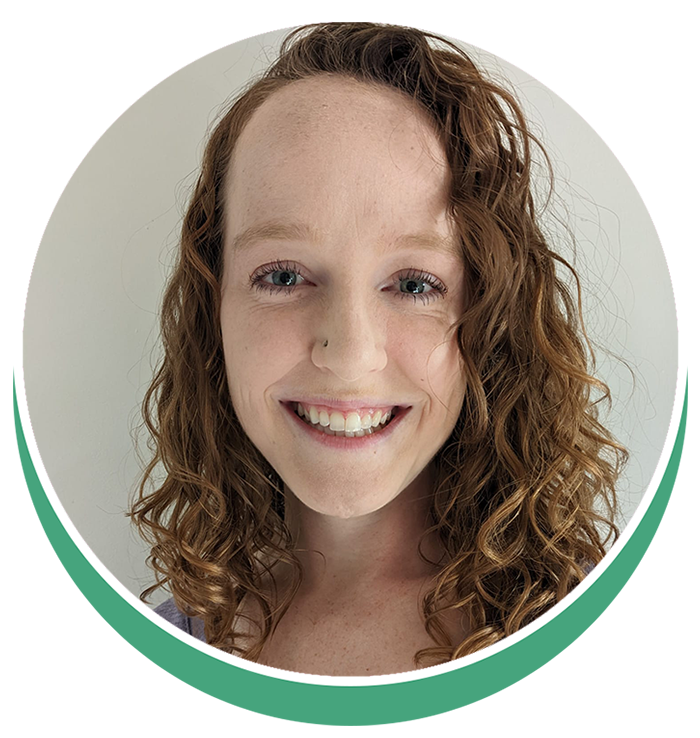
Allison Carnio (she/her)
MScPT, BScKin
Licensed Physiotherapist
Sherwood Park Location
Pediatric Physiotherapist
Children & Teens
- Pediatric Musculoskeletal Physiotherapy
Post-Secondary Education:
- Master’s of Science in Physical Therapy, University of Alberta, 2018
- Bachelor of Science in Kinesiology, University of Alberta, 2016
Additional Training:
- Level 1: Physical Therapy Management of Urinary Incontinence
- Diploma of Advanced Orthopedic Manual and Manipulative Therapy: Level 2 Upper Quadrant
- 200 hr Trauma-Informed Yoga Teacher Training
- Clinical Update: Stress Urinary Incontinence and Pelvic Organ Prolapse Research and Management Review
- Level 2: Role of Physical Therapy in the Treatment of Pelvic Pain
- Level 3: Biopsychosocial Reframed
Philosophy:
Allison’s treatment philosophy is based on the belief that a thorough assessment creates the foundation of a successful treatment plan. Allison deeply understands that the transition into motherhood is a significant life event with many things to learn along the way. In Allison’s person and professional experience, she has found that education can go a long way in easing this transition and therefore her treatments include an educational component as well as manual therapy techniques and therapeutic exercise. Her goal is to meet clients where they are – whether that be non-pregnancy, pre-conception, pregnancy, early postpartum, or months or years postpartum – in order to help then meet their treatment goals and ultimately get back to the activities in which they find fulfillment.
Fun Fact:
I am an identical twin! I also have fraternal twin daughters and a third girl who is 20 months older than the twins.

Victoria Wilk
Licensed Physiotherapist
Pediatric Physiotherapist
- Pediatric Musculoskeletal Physiotherapy
- Pediatric Pelvic Health
Post-Secondary Education:
- Master’s of Science in Physical Therapy, University of Alberta, 2019
- Bachelor of Science, MacEwan University, 2016
Additional Training:
- Functional Dry Needling
- Level 1 – Treating Urinary Incontinence
- Level 2 – Pelvic Pain Through a Trauma Informed Lens
- Non-Internal Pelvic Health Considerations
Biography:
Victoria’s philosophy surrounding her approach to physiotherapy stems greatly from her personal experience, as a patient herself when she was a child. The care she received when she was younger, was unfortunately not patient centered, collaborative, empowering, or respectful of body autonomy – and this led her to drop out of rehab and ultimately the high-level sport Victoria was competing in at the time. As Victoria decided her career path as an adult, and landed on physiotherapy she knew this experience had to shape the care provider she would be. Hence, her mission with clients is to make them feel everything she didn’t. Victoria wants patients to know that she is there to support them, but also make them feel empowered with knowledge to help themselves beyond their appointment. Victoria wants patients to feel as though they are part of the process, and treatments will always be guided by their goals and respectful of their personal comfort level. If you work together she aims to always make you feel heard, and comfortable and from there Victoria believes you can almost always achieve the goals you are hoping to work towards.
Fun Fact:
One reason I chose to be a physiotherapist is because I LOVE to work with my hands. But when I am not getting this fill at work I fiddle at home, and have taught myself to learn almost any craft that I’ve ever been interested in. I can hand embroider, sew, wood carve, make soap or lotions, grow a cut flower garden from seed, have renovated my entire house and built an outdoor greenhouse with my husband, share a home pottery studio with my in-laws, and the list goes on.
21
Team Members
2K+
Patients Treated
30
Kids Between Us
Get in Touch
Please fill out the form below and will get back to you.
[contact-form-7 id=”8″ /]










